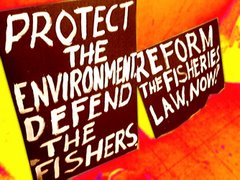
Ecology lawyers question Naga ash waste deal
By Ma. Bernadette A. Parco, Editorial Assistant
Why did the province of Cebu pay P100 million to buy land in Naga town that is partly submerged in water? And what are the health safeguards of using it as a dumping site for ash from coal-fired power plants to be built in Naga?
These questions were raised by environmental lawyers following the Cebu provincial government's announced plan to install a coal ash waste facility there and to reclaim five hectares of the 25-hectare Balili beach resort using the waste ash of Kepco’s power plants once they operate in 2011.
“Only alienable land of public domain may be conveyed into private ownership,” said lawyer Benjamin Cabrido in a press conference. He was referring to the beach resort bought from the late Engr. Luis Balili last year.
Cabrido said they were informed that 40 percent of the property is submerged in water.
“That property which includes a mangrove area cannot be titled at all. Why did the province pay P100 million when this is land in the public domain?” he asked.
The health risks of coal-fired plants were also raised by the lawyers.
“This is not ordinary ash that you get when you burn firewood. This is a fossil-based fuel coal,” said Cabrido.
Vince Cinches, Center for Fisherfolk Development executive director, said they measured the volume of heavy metals found in coal ash in Toledo City and Naga town in Cebu.
The coal ash contained 1.70 ppm (parts per million) of arsenic, 1.00ppm of chromium, 2.30 ppm of lead and 0.07 ppm of mercury.
Arsenic, lead and mercury are toxic heavy metals.
Lawyers Cabrido and Gloria Estenzo-Ramos sent a letter of complaint to Cebu Gov. Gwendolyn Garcia, Vice Gov. Gregorio Sanchez and Provincial Board members yesterday.
PB Majority Floor Leader Victor Maambong said they received the “open letter” before yesterday's session and will hold a caucus to discuss its concerns.
In the letter, the lawyers sought a copy of the signed Memorandum of Agreement (MOA) between the Cebu provincial government and Kepco and all pertinent documents in the agreement.
Cabrido said they asked for a copy of the Environmental Compliance Certificate or ECC, the Deed of Sale and a copy of the Statements of Income and Expenditures of the province for the past three years.
The lawyers also asked Cebu officials to disclose what programs they implemented to protect the environment in accordance with such laws as the Clean Air Act, Clean Water Act and the Fisheries Code of the Philippines.
Under the Local Government Code, LGUs should prioritize funds for health, sanitation and environment, said Ramos.
“People living near coal-fired power plants have a very high incidence of cancer. The plants produce carbon and other greenhouse gases that contribute to global warming. The water is contaminated with heavy metals,” she said.
“Has the government purchased equipment to measure the quality of air, water and sea where coal power plants and polluting activities are located?” Ramos asked.
With Reporter Doris C. Bongcac




